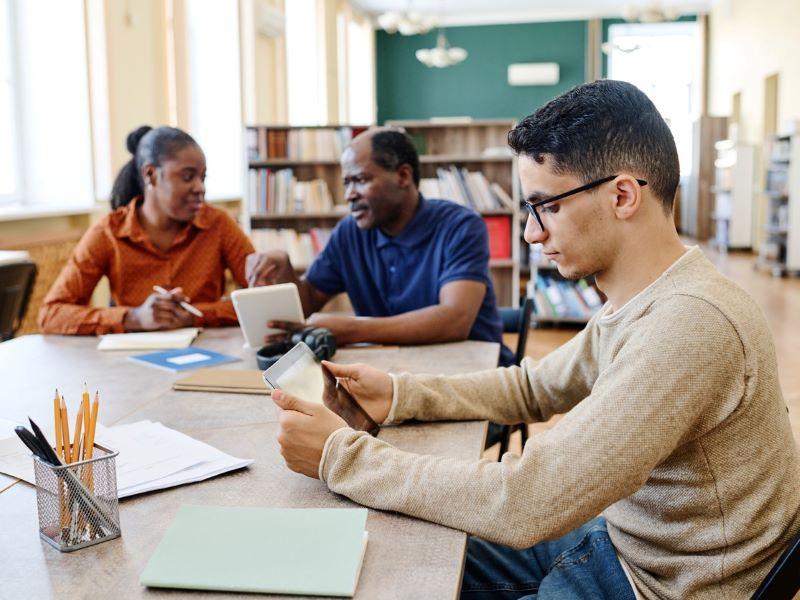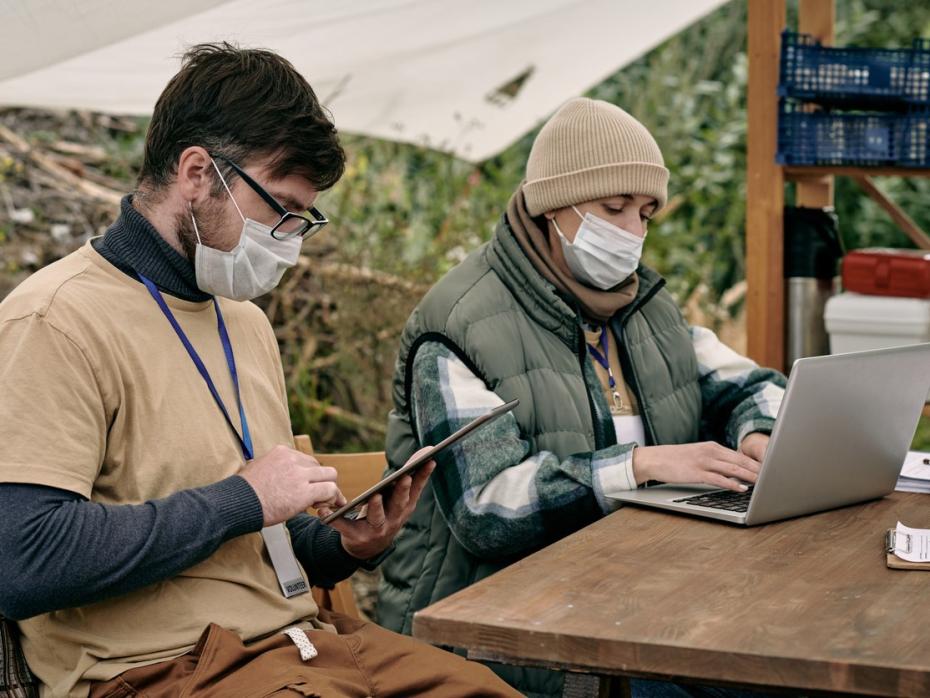Since 2017, the Open Learning Initiative (OLIve) at the University of East London has been supporting forcibly displaced people to access higher education through a programme of in-person and online university preparatory courses, pastoral and financial support, and one-to-one mentoring.
OLIve helps students to find out what skills and knowledge are needed to apply for and succeed in UK higher education. A growing number of OLIve UP Scholarships are offered to asylum-seeking students who have no access to public funds, to undertake Level 3 foundation courses, which offer entry into degree programmes or can be used as Ucas credits. In 2022, 18 students were offered Scholarships for OLIve UP University Certificates with funding support from European bodies including Erasmus and the Open Society University Network (OSUN). The project forms part of a partnership of European universities, including the Central European University in Budapest, Bard College Berlin and the University of Vienna. This year, OLIve at UEL has spearheaded an application to become a University of Sanctuary.
- Spotlight collection: what universities can do to assist refugees
- Helping refugees get their qualifications recognised
- How open knowledge strengthens democracies
Here we share lessons from the five years that OLIve at UEL has worked with forcibly displaced people to overcome the many barriers they face in accessing higher education. We use the term “forcibly displaced” to refer to the experience of people seeking protection in the UK, and “refugees and asylum seekers” where their legal status impacts their rights and entitlements. This is a summary of some of the things that universities can do to promote equity in education for refugees and asylum seekers.
Be trauma-informed and develop supportive relationships
Be mindful that forcibly displaced students may have experienced multiple traumatic events, separations and losses. While these students are often enormously resilient, determined and focused, they are likely managing multiple complexities, both practically and emotionally. It is helpful to spend time building supportive relationships with students through regular contact in person, online and brief check-in emails and phone calls. Be kind, curious and open to learning from them; find ways to make connections with students that preserve dignity by taking the time to find out about their interests and goals. Welcome them into the university by ensuring that they can access the same services as all students. Enable a sense of belonging by encouraging them to engage with campus-based student groups and activities. Make yourself easily accessible via email or in person. Make an effort to learn and pronounce students’ names correctly. Acknowledge the challenges they face as a displaced people in the UK and be prepared to advocate on their behalf when needed. This may be the students’ first experience of education in the UK; help them to progress and gain relevant work-experience or paid employment by being a referee.
Help students to navigate systems
Refugee and asylum-seeking students face constant barriers in their attempts to access education, support and resources. As university staff, we can help students navigate complex systems, from application processes to student finance and access to well-being services. In each encounter ask, “How, in this particular moment, can I use my power to help this student access the resources and support they need?” and act accordingly. Where appropriate, get to know students and understand their current circumstances: what is their housing situation, do they have access to the internet or suitable childcare? Introduce students to colleagues and services that enable access to resources to support learning and well-being.
Consider financial barriers
One of the most significant barriers to accessing education is money. Under current legislation, asylum seekers have no recourse to public funding, they are not allowed to work, and they face obstacles to opening a bank account. The small weekly stipend they are entitled to is not enough for travel expenses. As universities are increasingly becoming “cashless”, solutions have to be found. Setting aside a petty cash budget or providing vouchers for local budget supermarkets can allow universities to support these students with living and travel expenses.
Establish partnerships and networks locally and nationally
Build strong working relationships with professionals in local and national community services and organisations with expertise in working with refugees and asylum seekers, such as Student Action for Refugees (STAR) and Refugee Education UK (REUK). These organisations are a great resource for up-to-date knowledge and information on the asylum system and access to education. For example, STAR keeps an updated user-friendly database of Sanctuary scholarships at universities throughout the UK. Identify other universities offering opportunities to forcibly displaced people, for example, Birkbeck’s Compass Project, and the Universities of Sanctuary network, and liaise with them to facilitate student access and knowledge exchange. Participation in relevant forums can help you to understand the issues that other university staff face when trying to support asylum seeker and refugee students, and the solutions they’ve found. These professional networks are crucial.
Build inclusive curricula
Students come to the classroom with a wealth of knowledge, and many have already studied at university in their home countries. In designing access programmes, it is important to draw on asset-based pedagogical approaches that affirm and connect to students’ cultural backgrounds and instil equity-centred pedagogies to foster the well-being of all students. In practical terms, this means developing an inclusive curriculum that engages with a variety of course materials and assessment methods as well as accommodating different learning styles. Building an asset-based curriculum also means finding ways to integrate students’ ideas into class content. Offer diverse courses, from English-language TEFL preparation, public speaking to support learners in gaining confidence and preparing for interviews, creative arts and subject-specific introductory lectures. Leverage the expertise across your institutions and local community: lecturers, students and college admissions personnel all have key roles to play.
Connect with universities internationally
Through funding initiatives such as the Open Society University Network’s (OSUN) Hubs for Connected Learning, UEL staff and OLIve students have organised webinars, online workshops and face-to-face conferences with institutions in Vienna, London, Berlin, Budapest and Thessaloniki. Creating international social networks to support refugee education is an excellent way to leverage expertise by sharing best practices, co-developing practical tools and teaching resources, collaborating on research and pursuing funding opportunities.
Leverage technology to scale
To ensure accessibility, where possible, explore different course delivery options. Hybrid, online and weekend courses offer accessibility to people with varied needs, responsibilities and commitments.
Embedding equity through inclusive values and practice
To create equitable, open and accessible higher education for all, universities need to embed these inclusive practices at all levels across leadership and management, administration, support services, teaching and research.
Yeşim Deveci is director of OLIve and senior lecturer in the School of Education and Communities; Claire Mock-Muñoz de Luna is the OLIve project coordinator; and Jess Oddy is an OLive lecturer and PhD candidate at the Centre for Migration, Refugee and Belonging (CMRB), all at the University of East London.
They have been shortlisted for International Collaboration of the Year at the Times Higher Education Awards 2022. A full list of shortlisted candidates can be found here.
If you found this interesting and want advice and insight from academics and university staff delivered direct to your inbox each week, sign up for the THE Campus newsletter.




comment